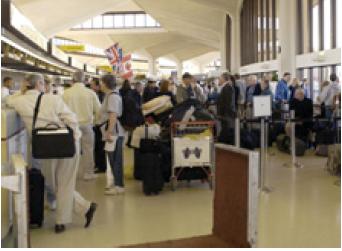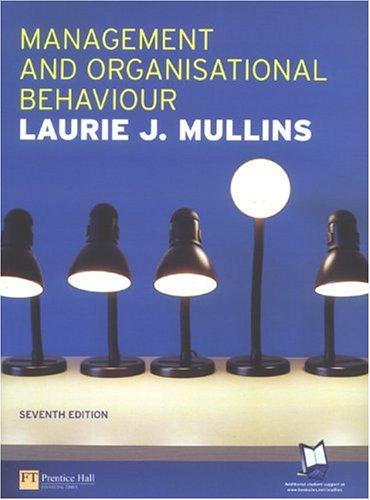My contact with my direct line manager is limited to irregular e-mails which are purely directional and/or
Question:
My contact with my direct line manager is limited to irregular e-mails which are purely directional and/or informative. At no point is there any attempt to either help with my staffing problems or to acknowledge that these may be stress related. It follows then that there is no form of motivation downwards from him to me, although it is taken for granted that I will be self-motivated and able to motivate my team.
In the highly competitive world of international air passenger transport, the bottom line is everything.
As such, all aspects of flight operations are subject to the rigorous cost-benefit analysis known as revenue per kilometre flown. This has led to some decisions which would deeply disturb Joe Public. When he purchases an airline ticket he is taking part in a lottery - the element of chance being the availability of the flight, seat class or flight time of his choice.
Joe Public feels that buying his ticket gives him this automatic right - but he should read the small print.
Price banding restrictions linked to historical marketing statistics allow airlines to estimate the number of passengers who will present themselves for a particular flight as opposed to those who will choose to exercise their flexibility muscle. For example, if 70 per cent of the plane's capacity is made up of economy seats, a condition of which is that no changes are allowed, then it can be reasonably assumed that this group will travel on the given day or not at all. Flexibility to price ratio continues up the scale until the top notch ticket is reached. The high price tag at this level promises that the airline will strive to provide the frequent flyer with all that he requires. Further, statistics indicate that having made this investment, he will almost certainly travel since, ceteris paribus, he has chosen to pay an inflated price to guarantee that he will reach his destination when and how he wishes.
At this stage there remains only one small percentage of passenger statistics to be correlated and here restrictions linked to price again come into play, limiting the degree of usage of the flexibility muscle to the minority of passengers travelling 'open jaw'. These people will have paid a sufficiently large supplement in order to allow themselves the luxury of being flexible in their travel arrangements.
As one would expect, this market segment has been shown to be the most likely not to travel and it is this information which the airlines use in their
Should, as is likely, a proportion of this user group decide to change their plans, as is their right, then the airline would be faced with the economic disaster of high revenue seats flying empty and seriously reducing the company's desired margin of revenue. In order to cover this contingency proactively, the company chooses always to overbook these seats by the calculated percentage of passengers who will probably choose not to travel.
The above organisational difficulties are not new, however the systems in which they operate have changed drastically both in the attitude to acceptable levels of passenger discomfort and in the variety and number of duties which staff are now expected to carry out. As a manager in this environment Piet Andaro faces many challenges daily, the most daunting of which is to find a way to motivate his team who know with absolute certainty that during every shift they will have irate passengers.
They, the passengers, will see them as the acceptable outlet for their outrage at what they perceive as unjust/unfair treatment, not to mention downright bad service. When the expected treatment fails to materialise Joe Public is not so much outraged by the failure of the actual mechanics but that his faith and trust have been misplaced.
It is then the role of Piet and his team to achieve the unachievable - to not give the customer what he wants but to send him on his way feeling that he has received outstanding service by people who genuinely care about his needs. Most importantly to the airline, he will take with him such a positive feeling that he will happily use the airline in the future and encourage others to do so.
Questions
1. Consider the probable outcomes both short and long term should the present situation continue for:
■ Piet Andaro
■ the airline
■ the customer
2. Is the failure to recognise the high percentage of stress related absenteeism deliberate on the part of the airline, i.e. would it be more costly and therefore less cost effective to attempt to find a remedy, given that airlines traditionally have a particularly high staff turnover?
3. A new CS0 is appointed after a spate of public relations disasters. The CSO investigates and decides that poor motivation is at the root of the problem.
Compare the main process and content theories of motivation and discuss their suitability.
4. Many of today's fast-moving industries have a very public policy that they '... don't motivate individuals... we provide an environment for them to be self motivated'.
To what extent has the airline created this type of environment? Do you see a problem simply of poor recruitment?
5. What behavioural factors are important when attempting to find a method of motivation suitable to both Piet and Robert? Discuss whether it is possible to find one which will suit both.
Step by Step Answer:






